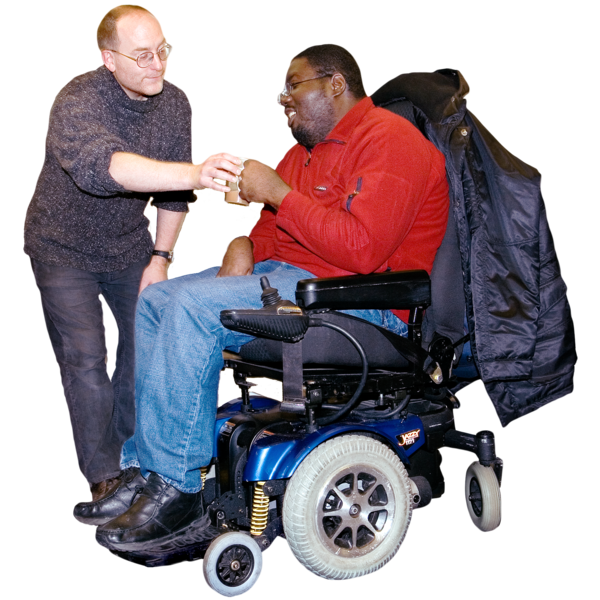Advocacy
 Advocacy is when you get support to have your say.
is a fancy word for helping people to speak for themselves.
Advocacy is when you get support to have your say.
is a fancy word for helping people to speak for themselves.
Advocates don’t speak on behalf of people with a
learning disability
 A learning disability is to do with the way someone's brain works. It makes it harder for someone to learn, understand or do things.
– they make sure a person's own voice is heard.
A learning disability is to do with the way someone's brain works. It makes it harder for someone to learn, understand or do things.
– they make sure a person's own voice is heard.
Advocates support people to develop the skills, confidence and knowledge they need to voice their concerns and make sure they are being treated right.
Advocates help people to:
- access information and services
- be involved in decisions about their lives
- explore choices and options
- speak out about issues that matter to them.
How advocacy services work
Mencap do not offer an advocacy service, but every
local authority
 A local authority is also called a
council
A local authority is also called a
council
 A council is also called a local authority. They are a group of people who make decisions about some of the things in the area where you live. These include: schools,
social care
A council is also called a local authority. They are a group of people who make decisions about some of the things in the area where you live. These include: schools,
social care
 Social care means the services that give care and support to people who need it.
(support for people), parks and dustbin collection.
. They are a group of people who make decisions about some of the things in the area where you live like schools, social care (support for people), parks and dustbin collection.
commissions advocacy services to support people who need help making their voice heard.
Social care means the services that give care and support to people who need it.
(support for people), parks and dustbin collection.
. They are a group of people who make decisions about some of the things in the area where you live like schools, social care (support for people), parks and dustbin collection.
commissions advocacy services to support people who need help making their voice heard.
Advocacy services are provided by an advocate who is independent, and who is not part of your family or one of your friends.
Being independent means they are there to represent wishes without giving their personal opinion and without representing anyone else’s views.
How an advocate will support you
If you have a learning disability, an advocate might help you access information you need or go with you to meetings or interviews in a supportive role.
An advocate's role includes making sure correct procedures are followed and making sure your voice is heard. You may want your advocate to write letters on your behalf, or speak for you in situations where you don't feel able to speak for yourself.
Useful resources
We've created the following factsheets to help you with the benefits application, Care Act
assessment
 An assessment is a way of finding out what help a person needs. When you have an assessment, you might have to go to a meeting or fill in a form.
and follow-up process:
An assessment is a way of finding out what help a person needs. When you have an assessment, you might have to go to a meeting or fill in a form.
and follow-up process:
Delays in receiving benefits (PDF, 52 KB) - this factsheet explains the options that may be available to you whilst you're waiting for your first payment.
Mandatory reconsiderations (PDF, 48 KB) - this factsheet explains what to do if you wish to challenge a benefit decision.
Reasonable adjustments (PDF, 425 KB) - this factsheet explains what changes should be made by the Job Centre and DWP for people with a learning disability who are looking to claim benefits.
What happens next (PDF, 367 KB) - this factsheet sets out what should happen after your Care Act assessment.
Reviews and new assessments (PDF, 219 KB) - this factsheet is for people who already receive care and support through a package of social care and what they can expect from the review and assessment process.
Direct payments (PDF, 72 KB) - this factsheet explains how people with a learning disability and their families can receive
direct payments
 Direct payments are when the money for your care and support, or benefits, is paid to you.
to arrange their social care support themselves.
Direct payments are when the money for your care and support, or benefits, is paid to you.
to arrange their social care support themselves.
How to get the support you need
Contact the Learning Disability Help, for
guidance
 Guidance means being given clear instructions to be able to do something well.
and information about what support we can offer you.
Guidance means being given clear instructions to be able to do something well.
and information about what support we can offer you.
Or why not take a look at our online
community
 A community is the people and places in an area.
? This is a place for parents and family carers of people with a learning disability to share experiences, advice and support.
A community is the people and places in an area.
? This is a place for parents and family carers of people with a learning disability to share experiences, advice and support.
